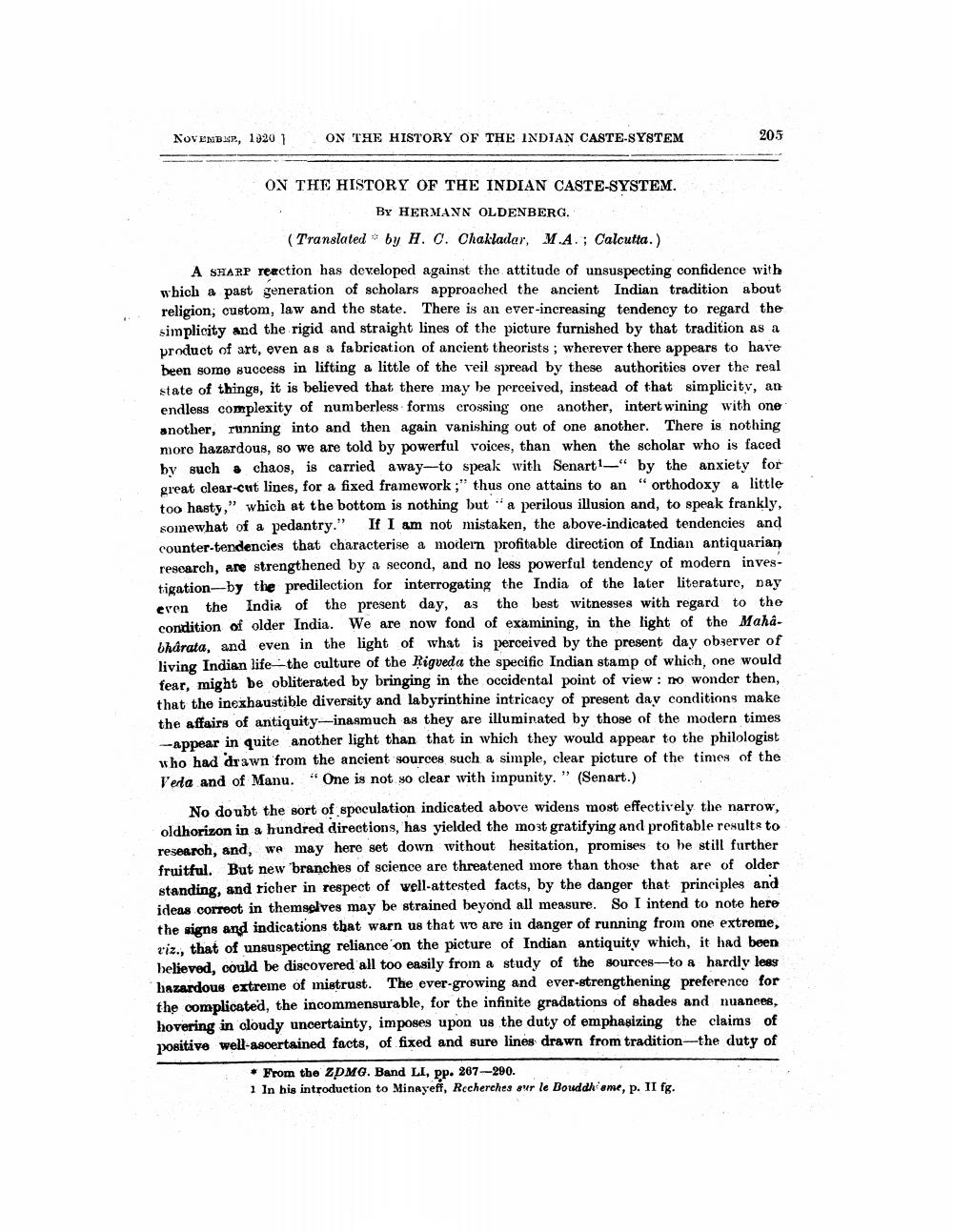________________
NOVEMBER, 1920 1
ON THE HISTORY OF THE INDIAN CASTE-SYSTEM
205
ON THE HISTORY OF THE INDIAN CASTE-SYSTEM. BY HERMANN OLDENBERG.
(Translated by H. C. Chakladar, M.A.; Calcutta.)
A SHARP reaction has developed against the attitude of unsuspecting confidence with which a past generation of scholars approached the ancient Indian tradition about religion, custom, law and the state. There is an ever-increasing tendency to regard the simplicity and the rigid and straight lines of the picture furnished by that tradition as a product of art, even as a fabrication of ancient theorists; wherever there appears to have been some success in lifting a little of the veil spread by these authorities over the real state of things, it is believed that there may be perceived, instead of that simplicity, an endless complexity of numberless forms crossing one another, intert wining with one another, running into and then again vanishing out of one another. There is nothing more hazardous, so we are told by powerful voices, than when the scholar who is faced by such a chaos, is carried away-to speak with Senart" by the anxiety for great clear-cut lines, for a fixed framework;" thus one attains to an "orthodoxy a little too hasty," which at the bottom is nothing but a perilous illusion and, to speak frankly, somewhat of a pedantry." If I am not mistaken, the above-indicated tendencies and counter-tendencies that characterise a modern profitable direction of Indian antiquarian research, are strengthened by a second, and no less powerful tendency of modern investigation by the predilection for interrogating the India of the later literature, nay even the India of the present day, as the best witnesses with regard to the condition of older India. We are now fond of examining, in the light of the Mahabharata, and even in the light of what is perceived by the present day observer of living Indian life the culture of the Rigveda the specific Indian stamp of which, one would fear, might be obliterated by bringing in the occidental point of view: no wonder then, that the inexhaustible diversity and labyrinthine intricacy of present day conditions make the affairs of antiquity-inasmuch as they are illuminated by those of the modern times -appear in quite another light than that in which they would appear to the philologist who had drawn from the ancient sources such a simple, clear picture of the times of the Veda and of Manu. "One is not so clear with impunity." (Senart.)
No doubt the sort of speculation indicated above widens most effectively the narrow, oldhorizon in a hundred directions, has yielded the most gratifying and profitable results to research, and, we may here set down without hesitation, promises to be still further fruitful. But new branches of science are threatened more than those that are of older standing, and richer in respect of well-attested facts, by the danger that principles and ideas correct in themselves may be strained beyond all measure. So I intend to note here the signs and indications that warn us that we are in danger of running from one extreme, viz., that of unsuspecting reliance on the picture of Indian antiquity which, it had been believed, could be discovered all too easily from a study of the sources-to a hardly less hazardous extreme of mistrust. The ever-growing and ever-strengthening preference for the complicated, the incommensurable, for the infinite gradations of shades and nuances, hovering in cloudy uncertainty, imposes upon us the duty of emphasizing the claims of positive well-ascertained facts, of fixed and sure lines drawn from tradition-the duty of
*From the ZDMG. Band LI, pp. 267-290.
1 In his introduction to Minayeff, Recherches sur le Bouddhisme, p. II fg.




